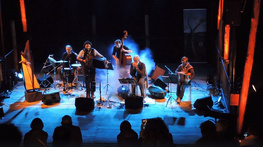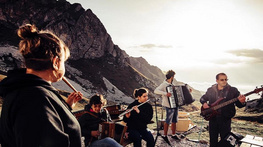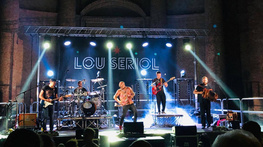The rediscovery of the Occitan language in the valleys has led, since the 1980s, also to a re-proposition of the ancient music and traditional dances presented in a new key, also thanks to the introduction, near traditional instruments such as violins, accordions, squeeze boxes and hurdy gurdy, of new instruments such as drums, guitar and electric bass. This allowed on the one hand to save music, songs and dances that seemed destined for oblivion, and on the other to expand the reference audience, bringing many young people closer to the local scene. This while process is fully part of the musical current of the so called “folk revival”.
Stura Valley also features some very important groups from the Occitan music scene.
Lou Seriol
The most famous group in the Valley is represented by Lou Seriol, formed in 1992 in Aisone, initially with a purely acoustic formation (squeeze boxes, galoubet, voice), and then over the years they have moved on to equip themselves with not entirely traditional instruments (congas, guitar and electric bass), thus starting a path of experimentation that has given life to their sound consisting of a mixture of different musical genres such as rock, punk, ska and reggae.
in 2000 they released their first album “Persi Pien” which broke with the classical Occitan scene of the time, thus launching Lou Seriol in a series of concerts in Italy and France.
In 2005 their second album “Reviori” was released, which makes use of important collaborations; Papet J, voice and founder of Massilia Sound System, Luigi Pastorelli, voice and founder of the Nice group Nux Vomica, Sergio Berardo and Dino Tron of Lou Dalfin and master Fabrizio SImond of the L’Escabot chorus.
In 2009 there was the release of the live album “Ambe Vos” recorder at Hiroshima Mon Amour in Turin and at the Ex-Officine Bertello in Bordo San Dalmazzo (Cn) which, in addition to containing the best-known tracks of the band, also present some unreleased songs, including their version of the Occitan hymn “Se chanto”.
In 2012 “Maquina Enfernala” was released, a concept album dedicated to current issues, such as television, immigration, which demonstrates a more mature sound and characterized by greater experimentation both at the thematic and musical level.
Finally, in 2018 comes the latest Occitan work featuring twelve new tracks, including a cover of the Sex Pistols song “Anarchy in the UK”, adapted to the Occitan sound, as a tribute to the 40 years of the punk scene and the 25-year career of the “Squirrels” of Aisone.
La Mesquia
La Mesquia aims to be consisten with tradition not only by maintening language and musical peculiarities, but also by using a series of “typical” instruments.
In 2011 the first recording work of the group “En l’aire ailamont” was released linked to the Occitan tradition, inspired by the life lived by the people of the valleys, memories, landscape and housing changes and history, research, love, consideration of who and how we are today and by the observation of some events or moments of life.
In 2013 the second album “Podre” was released, which has known a series ofimportant reviews, due to the ability to ferry the musical and linguistic history typical of the group towards the production of new music.
Finally, in 2019 is released the latest work “L’arbol”, which sees Elena Ledda and Chiara Cesano as Guests. Of considerable importance is also the first theatrical show of La Mesquia realized in collaboration with the actor Luca Occelli entitled “Trees, Donkeys, Men and Women”.
Lhi Destartavellà
They are called Lhi Destarvelà, “the neck-watering", they love to get carried away by their music and not think about anything else. Lhi Dastartavelà were “officially” born in July 2008. They met attending the lessons and essays organized by Sergio, Berardo, Simonetta Baudino and Simone Lombardo. They have in common the desire and pleasure to play traditional Occitan music, with some personal insertions (some pieces are of their composition), using traditional instruments – diatonic squeeze box, hurdy gurdy, flutes, galobet, bagpipes – mixed with “modern” instruments such as electric bass and cajon.



